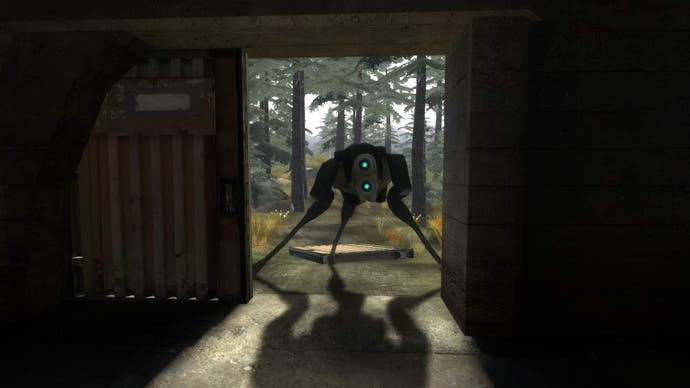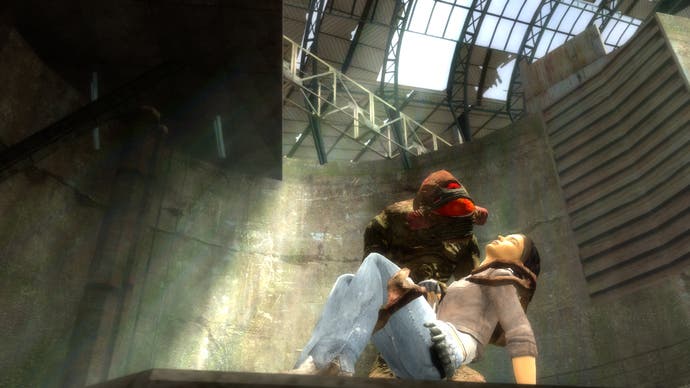Valve talks Episode Two
David Speyrer, Gautam Babbar and Doug Lombardi open up.
By now you'll have read our extensive hands-on report on Half-Life 2: Episode Two. Well, hopefully. Having spent an hour working through each of the six sections Valve prepared for us to play, we sat down with programmer David Speyrer, designer Gautam Babbar and Valve's ever-present marketing director Doug Lombardi and talked about the development of Episode Two, the release date issue, and where things might be going in Episode Three.
I think it's the settings and the freeform gameplay. The Hunters, too. Episode Two has less of a singular focus than Episode One. It's more of a mini epic, like Half-Life 2 on a smaller scale.
Yes.
Gosh - there's so many!
A lot of the stuff we learned in Episode One was about Al - about how to make an interesting companion - so all that folded into Episode Two, and just expanded on that, and adding Vortigaunts and expanding on that. We've got a lot of feedback on Al so we've tried to incorporate that.
Commentary was obviously well-received, so we'll be paying attention to that not only in EpTwo but Portal and Team Fortress 2 as well.
One thing we learned was... The development overlapped a bit, and it was interesting and tricky. Some of the things you see in Episode Two were foreshadowed in Episode One, and that's always a delicate act when you have a product that's in development and you need to relate that to a product that's coming out much sooner. So we learned a lot about storytelling and making sure the two episodes really agree with each other.
The new environments also sprung from feedback on Episode One, where we restrained you to mostly City 17 and in Episode Two we felt like we wanted to open that up a lot more to contrast with Episode One.

We had... I guess we'll call it a sketch of how the topography would change because we do have an ultimate goal in mind and that's been somewhat fixed from the very beginning. So a lot of it was about creating a natural progression of topography and climate towards that ultimate goal.
Valve's always good at making quality games but is pretty crap about making time estimates for release dates. I think episodic or whatever we're going to end up calling this ten years from now was a really new thing. We saw a desperate need to change the formula after Half-Life 2 took us six years and 40 million dollars to create. That was the biggest project I've worked on in my life and I think pretty much everybody who worked on it would say that. It was great, we're really proud of it, but it was a long road to haul.
So I think we saw an opportunity to change, and fortunately we're in a luxury position of being able to take a shot at something new. And we learned some stuff from it. When we first set out to do it we thought it would happen more quickly than it has, but still, we released Episode One sixteen or seventeen months after Half-Life 2 and Episode Two's going to come in roughly the same amount of time as Episode One, and hopefully Episode Three continues that.
For us, once we're all said and done we're going to be able to say we've released them more frequently. Overall Half-Life 3 or Half-Life 2 The Episodes or whatever you want to call this ended up coming about more quickly than six years, so I think that some of the things we projected at the first - the name, the time-length of releases - we were pretty off on, but the idea was that this development would produce better games faster and we'd be happier and gamers would be happier. I think that we're proving that. I mean, the packaging has changed too, right? Episode One was 20 bucks by itself, and this one's going to be in The Orange Box with Portal and Team Fortress 2. We're learning, and we're reacting too. That goes to design of the environments that you play in as well as the way it's packaged up and so on.

Yeah, you could have said the same thing about Counter-Strike: Source and Half-Life 2 when those came out. Way back in the day when Team Fortress came out it was going to be an add-on pack for Half-Life 1 and there was a decision that Gabe and myself and a bunch of other people made that we might try do a Game Of The Year Edition instead and release Half-Life and Team Fortress Classic together, but make TFC available to everyone for free.
That worked out really, really well for us. We saw that there was power in combining those things. The sum of them together was greater than the parts themselves, and we were in a lucky position where TF2, EpTwo and Portal were all going to end up stepping right on top of each other, so we asked ourselves, 'do we want to release each one every three weeks over the course of the holiday or whenever they come out, or just put them in one box and sort of follow that tradition of the Game Of The Year Edition for Half-Life 2?' We talked about it and after a while everyone was behind this idea of putting all three together. And there's the fact we're going to multi-platform. Multi-genre, multi-platform, there's a certain cool thing about it.

